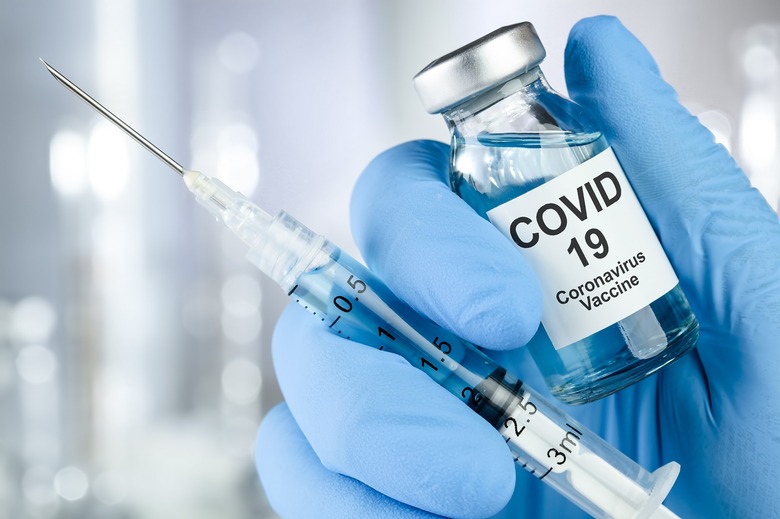Dr. Fauci Delivered The Best News You'll Read All Week About The Coronavirus Vaccine
- Dr. Fauci is confident the U.S. can start vaccinating 1 million Americans per day.
- During a recent interview, Fauci said the FDA may approve a new COVID-19 vaccine from Johnson & Johnson in the next few weeks.
- Johnson & Johnson's coronavirus vaccine only requires a single dose as opposed to the two required by Pfizer and Moderna's COVID vaccines.
The United States, unfortunately, isn't anywhere close to meeting some of the more optimistic vaccine projections made by health experts last month. In the weeks preceding the rollout of Pfizer's COVID-19 vaccine, officials from Operation Warp Speed said the U.S. would be able to vaccinate 20 million Americans by the end of January and 100 million Americans by the end of February.
As it stands now, the U.S. has administered an estimated 14.3 million vaccine doses since mid-December. At the current rate, the U.S. will be lucky to reach the 20 million threshold before the end of the month. And it goes without saying that vaccinating100 million people by the end of February is nothing short of a pipedream at this point. The good news, though, is that the vaccine rollout is slowly becoming more efficient and should continue to improve over the next few weeks. What's more, Dr. Fauci, during a recent appearance on NBC's Meet The Press, said that the U.S. is completely capable of hitting a vaccination rate of 1 million Americans per day. Incidentally, President-elect Joe Biden has promised to vaccinate 100 million Americans within his first 100 days of office.
"One thing that's clear is that the issue of getting 100 million doses in the first 100 days is absolutely a doable thing," Fauci explained. "The feasibility of his goal is absolutely clear. There's no doubt about that, that that can be done."
Previously, Fauci has referenced the massive vaccination effort undertaken by the U.S. in the late 1940s to eradicate smallpox as proof that the U.S. can accomplish a similar feat vis-a-vis the coronavirus.
"New York City in March and April of 1947 vaccinated 6,350,000 people, 5 million of which they did in two weeks," Fauci said two weeks ago. "I was a six-year-old boy who was one of those who got vaccinated. So, if New York City can do 5 million in two weeks, the United States could do a million a day. We can do it."
An additional piece of promising news is that the supply of COVID-19 doses could increase significantly in the near future. Aside from Pfizer and Moderna ramping up their own production, Fauci said that Johnson & Johnson and AstraZeneca are planning to release the results of their respective COVID-19 vaccine trials very soon. If the data is encouraging, two additional vaccines could receive an Emergency Use Authorization (EUA) from the FDA shortly.
"We're weeks away," Fauci said, "not months away."
One of the more promising aspects of Johnson & Johnson's vaccine, should it be deemed to be safe, is that it only requires a single dose as opposed to the two required by Pfizer and Moderna's vaccine. What's more, Johnson & Johnson's vaccine doesn't need to be stored at a specifically cold temperature like Pfizer's.
Incidentally, the early results from Johnson & Johnson's vaccine trials have yielded promising results. The company said the following in a press release late last week:
The Phase 1/2a interim analysis showed that the Company's COVID-19 vaccine candidate induced an immune response and was generally well-tolerated across all study participants. Data demonstrated that, after a single vaccination, neutralizing antibodies against COVID-19 were detected in over 90 percent of study participants at Day 29 and 100 percent of participants aged 18-55 years at Day 57. These neutralizing antibodies remained stable through Day 71, currently the latest timepoint available in this ongoing study, in all participants aged 18-55 years. Data on durability of immune responses in trial participants aged over 65 years will be available in late January and longer-term follow-up to one year is planned.
As to the current state of the pandemic, the U.S. has seen more than 24.1 million COVID-19 cases and almost 400,000 deaths since the pandemic began. Dr. Fauci anticipates that life in the U.S. will likely return to normal sometime between late September and November.
